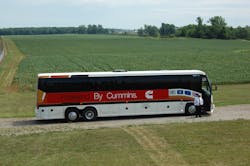Cummins aims to offer electrified powertrain in two years
Engine maker Cummins expects to start building and selling electric powertrains for transit bus applications in 2019, with a “longer-range version” available by 2020, as the OEM believes electricity will become a key commercial vehicle power source in the near future.
“We know things about electrification that maybe others don’t,” explained Julie Furber, executive director of electrification business development for Cummins, explained in an hour-long conference call with reporters this week. “We believe that electrified power will come to all of our markets in one way, shape or form.”
She said that transit buses in cities around the world would likely be the first vehicles to have this new technology, with other Cummins executives adding that other “industrial and commercial uses” would follow.
Cummins chairman and CEO Tom Linebarger said on the call that the company was upping its investment into electrification while continuing to focus on diesel fuel engines as well. He stressed that Cummins was more than an engine maker, now and going forward.
“We are also a technology company,” he asserted, while also stressing that “the trucking industry was built on the back of Cummins. But we are not just a diesel engine company. Oftentimes because we’ve been so successful in diesel engines people think that’s what defines Cummins, and it isn’t. We are a power technology company.”
Michael Baudendistel, vice president of the Stifel Transportation & Logistics Research Group – a division of Stifel Capital Markets – added in a research brief published after the conference call that the Cummins powertrain announcement is a “big deal” as it demonstrates the company is further along than was previously known in addressing what is likely its single biggest long-term risk: that electric will replace diesel as the dominant fuel source for commercial vehicle powertrains.
“We believe there are still many unanswered questions” about electric commercial vehicles, he noted, the “big three” being cost, weight, and range. For that reason “the pace of adoption [of electric powertrains] will be slower than seen in light vehicles,” Baudendistel said.
“But, no matter the timeline or eventuality, we believe Cummins has demonstrated that it intends to be a major player in that market when it develops and that it will not be caught flat-footed if the market moves away from its core diesel engine business,” he pointed out.
“We believe the reality is closer to how Tom Linebarger [Cummins CEO and chairman] described,” Baudendistel emphasized. “Essentially, the company is a power generation technology company that is investing an a wide range of alternative fuels in order to disrupt its industry leading diesel engines before the company can be disrupted by a competitor.”
He also highlighted Cummins’ plans to increase research and development investment above its historical 3% to 4% range in order to fund investment in electrification and other “digital” offerings, such as telematics. “In our view, money well spent,” Baudendistel said.
About the Author
Michael Catarevas
Michael Catarevas is a former managing editor at FleetOwner. He wrote for the publication from 2017 to 2020.
